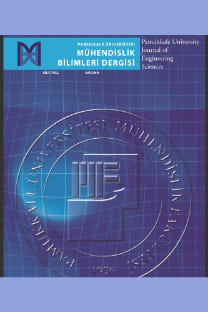Geri dönüştürülmüş kestamidlerin mekanik özellikleri
Kestamid, Döküm poliamid, Mekanik özellikler, Nem özellikleri
Mechanical properties of recyled cestamides
Cestamide, Cast polyamide, Mechanical properties, Humidity properties,
___
- Crawford RJ. Plastics Engineering, 2nd ed. Oxford, UK, Pergamon Press, 1987.
- Cowie JMG. Polymers: Chemistry & Physics of Modern Materials. 2nd ed. London, United Kingdom, Stanley Thornes Ltd, 1998.
- Kohan MI. Nylon Plastics Handbook. Munich, Germany, Hanser Publication, 1995.
- Samyn P, Baets PD, Schoukens G, Driessche IV. “Friction, wear and transfer of pure and internally lubricated cast polyamides at various testing scales”. Wear, 262(11-12), 1433-1449, 2007.
- Callister DW. Materials Science and Engineering an Introduction. Wiley international edition, New York, USA, John Wiley & Sons Inc, 2002.
- Kang SC, Chung DW. “The synthesis and frictional properties of lubricant-impregnated cast nylons”. Wear, 239(2), 244-250, 2000.
- Kang SC, Chung DW. “Improvement of frictional properties and abrasive wear resistance of nylon/graphite composite by oil impregnation”. Wear, 254(1-2), 103-110, 2003.
- Samyn P, Tuzolana TM. “Effect of test scale on the friction properties of pure and internal-lubricated cast polyamides at running-in”. Polymer Testing, 26(5), 660-675, 2007.
- Yabe T, Takajo T, Kato S, Ueki F. “Lubricant-supplying properties and durability of oil-impregnated polymers”. Tribology Transmation, 43(3), 453-458, 2000.
- Lin JX, Wang CY, Zheng YY. “Prediction of isothermal crystallization parameters in monomer cast nylon 6”. Computers and Chemical Engineering, 32(12), 3023-3029, 2008.
- American Society of Testing and Materials. “Standard Test Method for Tensile Properties of Fiber-Resin Composite”. American Society of Testing and Materials, Philadelphia, USA, Re-Approved, ASTM Standard D 3039-76, 1982.
- ISSN: 1300-7009
- Başlangıç: 1995
- Yayıncı: PAMUKKALE ÜNİVERSİTESİ
Yerel olmayan elastisite teorisine göre akışkan taşıyan nanokirişin serbest titreşimlerinin analizi
Süleyman Murat Bağdatlı, Necla Toğun
İbrahim ÇELİKYÜREK, Aytaç BİÇER
Rüzgâr çiftliklerinde veri zarflama analizi ve Malmquist endeksi yaklaşımları ile performans analizi
Yunus EROĞLU, Serap Ulusam SEÇKİNER
Tabakalı ve fonksiyonel olarak kademelendirilmiş küresel basınç kapları üzerine analiz
Alemdar Ongun, İbrahim Uzun, Onur Kadir Turgut
Ders programı çizelgeleme problemi için bir literatür taraması
Eş kalıp ekstrüzyon yöntemi ile alüminyum-magnezyum makrokompozit imalatı ve karakterizasyonu
Ensar Yıldırım, Halit Cebi, Murat Şen, Erkan Serdar Yılmaz
Yığın üretim yapan fırınlara işlerin yüklenmesi ve çizelgelenmesi: Tamsayılı programlama modeli
